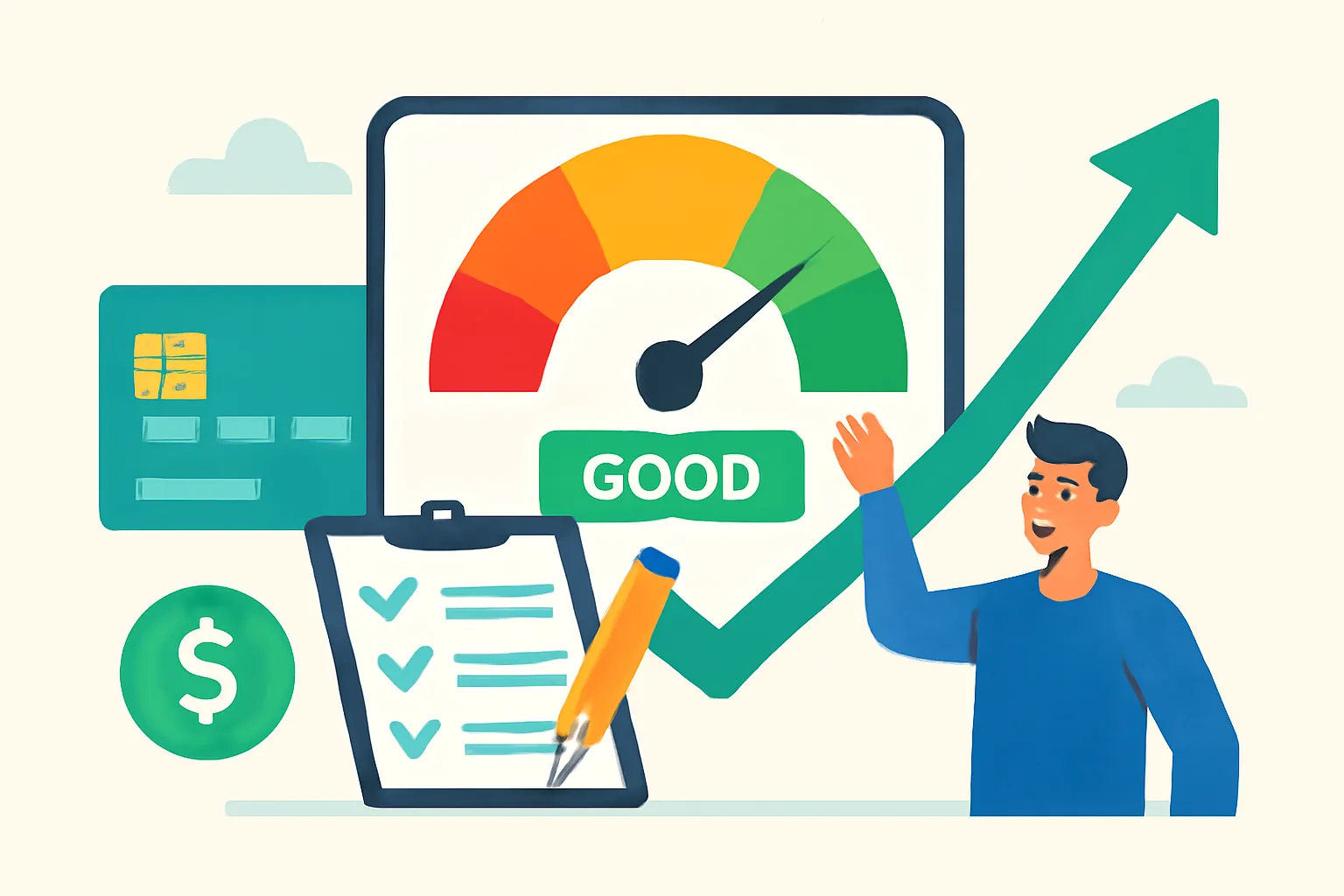Understanding Credit Scores: The Foundation of Financial Health
In today’s world, your credit score is much more than just a number. It serves as a gateway to financial opportunities, impacting your ability to secure loans, rent apartments, obtain favorable insurance rates, and even land certain jobs. If youre wondering how to improve your credit score or seeking the fastest ways to boost your rating, you’re not alone. Many people are looking for actionable steps to increase their credit score quickly and effectively.
Before diving into strategies to raise your credit score, it’s crucial to understand what a credit score is and how it’s calculated. Your credit score is a three-digit number, typically ranging from 300 to 850, that represents your creditworthiness. Lenders use this score to determine how likely you are to repay borrowed money.
What Factors Influence Your Credit Score?
- Payment History (35%): Your track record of paying bills on time.
- Credit Utilization (30%): The ratio of your credit card balances to your credit limits.
- Length of Credit History (15%): How long your accounts have been open.
- Credit Mix (10%): The variety of credit accounts you have (credit cards, loans, etc.).
- New Credit Inquiries (10%): The number of recent applications for credit.
By understanding these factors, you can develop a targeted plan to boost your credit score fast and maintain long-term financial health.
Check Your Credit Reports Regularly
The first step in any plan to increase your credit score is to review your credit reports. You are entitled to a free copy of your credit report from each of the three major credit bureaus—Equifax, Experian, and TransUnion—once every 12 months via AnnualCreditReport.com.
- Identify errors: Mistakes on your report, such as incorrect account statuses or fraudulent activity, can drag down your score.
- Spot negative items: Late payments, charge-offs, and collections should be reviewed for accuracy.
- Check for outdated information: Negative items should generally fall off your report after seven years (bankruptcies after ten years).
How to Dispute Errors on Your Credit Report
- Gather documentation supporting your claim.
- Contact the credit bureau in writing or via their online portal.
- Wait for investigation: The bureau must investigate your claim, usually within 30 days.
- Review results and ensure corrections are made.
Removing inaccurate negative items can provide a quick boost to your credit score.
Pay Your Bills On Time, Every Time
Timely payments are the single most important factor in your credit score calculation. Even one late payment can significantly damage your rating. If you’re searching for the fastest way to improve your credit score, make sure you never miss a due date.
Strategies to Ensure On-Time Payments
- Set up automatic payments for all recurring bills.
- Use payment reminders via your bank or budgeting apps.
- Consolidate due dates to make tracking easier.
- Contact creditors if you’re struggling—many offer hardship programs.
Consistently paying your bills on time will not only repair your credit score but also build a strong financial reputation over time.
Reduce Your Credit Card Balances
Credit utilization—how much of your available credit you’re using—is the second most significant factor in your credit score. Keeping your balances low relative to your credit limits can have a dramatic impact on your credit score.
Tips to Lower Your Credit Utilization Ratio
- Pay down high balances as quickly as possible, starting with cards closest to their limits.
- Ask for a credit limit increase (but avoid hard inquiries if possible).
- Spread out your charges across multiple cards rather than maxing out one card.
- Make multiple payments per month to keep balances low throughout your billing cycle.
Experts recommend keeping your credit utilization below 30%—and ideally under 10% for the best scores.
Don’t Close Old Credit Accounts
When considering how to raise your credit score, you might think closing unused credit cards is a good idea. However, closing old accounts can actually hurt your score by reducing your overall available credit and shortening your credit history.
When Should You Consider Closing a Credit Account?
- If the card has a high annual fee and you no longer use it.
- If keeping the account open encourages you to overspend.
- If it’s a joint account with someone you no longer trust.
In most cases, it’s best to keep old accounts open and use them occasionally to prevent closure due to inactivity.
Limit New Credit Applications
Every time you apply for new credit, a “hard inquiry” is added to your report. Too many hard inquiries in a short period can lower your credit score and signal to lenders that you may be a higher risk.
- Only apply for new credit when necessary.
- Rate shop within a short window (e.g., for mortgages or auto loans, multiple inquiries within 14-45 days usually count as one for scoring purposes).
- Check your own credit (soft inquiry) as often as you like—it won’t affect your score.
Being strategic about new credit applications is an essential part of any plan to boost your credit score quickly.
Use Credit-Building Tools and Products
If you have a limited credit history or are recovering from past mistakes, certain products can help you establish or rebuild credit:
Secured Credit Cards
- Require a cash deposit as collateral.
- Report to major credit bureaus just like traditional cards.
- Use responsibly to build a positive payment history.
Credit-Builder Loans
- Small loans held in a bank account until you repay them.
- Payments are reported to credit bureaus, helping you improve your credit score.
Authorized User Status
- Becoming an authorized user on someone else’s credit card can add their positive payment history to your report.
- Choose a trusted person with good credit habits.
These tools are particularly effective for those with thin or damaged credit files looking for ways to increase their credit rating.
Deal with Negative Marks and Collections
If you have collections, charge-offs, or other negative marks on your credit report, they can significantly drag down your score. Addressing these issues is a critical part of any credit repair strategy.
Steps to Handle Negative Items
- Validate the debt: Request verification from the collection agency.
- Negotiate a pay-for-delete agreement: Some collectors will remove the negative mark if you pay.
- Settle the debt: Even if the item remains, a “paid” status is better than “unpaid.”
- Monitor your credit report to ensure changes are reflected.
Over time, the impact of negative marks will fade, but taking proactive steps can speed up the process of improving your credit score.
Monitor Your Credit Score Progress
Consistently monitoring your credit score is essential for staying on track with your financial goals. Many banks and credit card issuers now offer free access to your FICO or VantageScore. Tracking your score allows you to see the impact of your actions and quickly address any new issues that arise.
- Set up alerts for major changes to your credit report.
- Review your report monthly for suspicious activity or errors.
- Celebrate milestones as your score improves, reinforcing good habits.
Knowing your score and understanding what affects it are key to maintaining and improving your credit rating over the long term.
Establish Good Financial Habits for Lasting Credit Health
While there are ways to boost your credit score fast, the most sustainable improvements come from developing healthy financial habits. Consider the following tips for long-term credit success:
Budgeting and Expense Tracking
- Create a monthly budget and stick to it.
- Track all your expenses to avoid overspending.
- Set aside funds for emergencies to prevent missed payments during tough times.
Use Credit Responsibly
- Borrow only what you can afford to repay.
- Pay off balances in full whenever possible.
- Resist the urge to open unnecessary accounts just for sign-up bonuses.
Seek Professional Help if Needed
- Credit counseling agencies can help you develop a plan to manage debt and improve your score.
- Financial advisors offer personalized guidance for complex situations.
The key to a higher credit score is consistency, patience, and a willingness to learn from past mistakes.
Common Myths About Improving Your Credit Score
There’s a lot of misinformation about how to fix your credit score. Here are some common myths—and the truth behind them:
- Myth: Checking your own credit hurts your score.
Fact: Personal credit checks are “soft inquiries” and do not affect your score. - Myth: You must carry a balance to build credit.
Fact: Paying off your balance in full each month is best for your score and your wallet. - Myth: Closing unused cards will help your score.
Fact: Closing cards can reduce your available credit and hurt your score, especially if they’re your oldest accounts. - Myth: Paying off a collection removes it from your report.
Fact: The item will still appear, but will be marked as “paid.”
Understanding the facts will help you avoid mistakes as you work to increase your credit rating.
Frequently Asked Questions About Credit Score Improvement
How long does it take to improve your credit score?
The timeline varies depending on your starting point and the actions you take. Some improvements, like correcting errors or paying down high balances, can show results in 30 to 60 days. More significant changes, such as rebuilding from missed payments or collections, can take several months to years.
What is the fastest way to raise your credit score?
- Pay down credit card balances to lower your utilization.
- Correct errors on your credit report.
- Make all payments on time moving forward.
These steps can provide a quick credit score boost for most individuals.
Can I pay someone to fix my credit?
While some credit repair companies offer legitimate services, be wary of scams. You can dispute errors and improve your credit on your own—no one can legally remove accurate negative information from your report before it ages off.
Does having no credit cards hurt my score?
Having no credit cards can limit your credit mix and reduce your available credit, both of which can lower your score. Responsible use of credit cards can help build and maintain a strong credit rating.
Conclusion: Take Control of Your Credit Future
Improving your credit score is a journey that requires patience, discipline, and strategic action. Whether you’re looking to buy a home, finance a car, or simply achieve peace of mind, a higher credit score will open doors and save you money. By reviewing your credit reports, paying bills on time, managing your credit utilization, and developing good financial habits, you can boost your credit score fast and set yourself up for long-term success.
Remember, there’s no magic bullet for overnight results, but with consistent effort and smart choices, you can watch your score climb month after month. Start today—your financial future depends on it!

